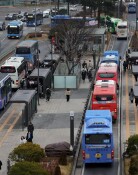Sluggish Economy Hitting Low-income Earners Mightily
Sluggish Economy Hitting Low-income Earners Mightily
Posted May. 29, 2008 10:39,
Runaway oil prices, inflation, the stagnant domestic economy and insecure employment are threatening the lives of the low-income bracket in Korea. The soaring costs of raw materials and commodities have left lower-income earners broke.
An increasing number of working-class families are spending more than their incomes due to the sluggish economy, which has worsened the job market and lowered their earnings.
Every day is a struggle. I barely make ends meet. Will the economy ever improve? a person asked. The Dong-A Ilbo took a closer look into the difficult lives of low-income earners.
○ Skyrocketing oil prices diminish incomes
Lee Hyo-yeol, who sells fruit from his small truck, bought 20 3-kilogram watermelons at the Garak-dong Agricultural and Marine Products Wholesale Market in Seoul Tuesday morning. He paid 3,700 won for each watermelon and sold them for 5,000 won apiece.
Ten thousand won watermelons weighing six to seven kilograms used to be popular, he said. But these days, 5,000 won watermelons are more popular. I guess its because people have thin purses.
A Dong-A Ilbo reporter followed Lee between 9:30 a.m. and 1:30 p.m. Lee sold 100,000 won worth of watermelons. He drove his truck to the Seoul wards of Gwangjin, Seongdong and Dongdaemun and used 15,000 won in gas.
To be exact, Ive earned 10,000 won for half a day, excluding lunch and gas, he said. Actually, this is better than yesterday, when I could not sell a single watermelon for two hours. I wonder if politicians and high-ranking officials know that ordinary people are having such a hard life.
Another Dong-A Ilbo reporter met tractor trailer driver Jeong Eun-soo the same day in Pyeongtaek, Gyeonggi Province. After going all the way to Namyangju this morning, I was paid 214,000 won. But after paying 184,000 for fuel and 19,000 for highway tolls, all I had left was 11,000 won. Im seriously considering quitting this job, Jeong said, letting out a sigh.
Another driver beside him also sighed and said, Because gas prices are so high, Ive been filling my truck with half kerosene and half diesel. I hear that the engine will break down in about six months if kerosene is mixed in with gas. But money-wise, its better to change the engine by paying less for gas.
○ Ive worked just one day this month.
At 5 a.m. the same day, some 400 day laborers gathered, many of them smoking, in small groups of twos and threes at the intersection near Namguro subway station in Seoul. As a van arrived, the jobseekers rushed to it. The van immediately left after picking up a few laborers. One man identified only as Jeong was smoking in front of the station exit where technicians specialized in iron bars and machinery await their chance to be picked up.
Jeong said, I used to work at least 20 days a month a few years ago. But these days, its even difficult to work three to four days a month. One in 10 people gets a job on a lucky day at the job market.
A daily laborer next to Jeong said, Though Ive worked as a day laborer for more than 30 years, Ive never seen the job market as bad as this. Ive worked only one day this month.
According to the Korea National Statistical Office, the number of workers classified as temporary or daily laborers fell by 123,000 in the first quarter this year due to a construction slowdown.
○ Dining out is a luxury
The costs of essential products and services such as heating, electricity and water have gone up, while the earnings of low-income families remain the same, making it difficult for them to make ends meet.
According to a report, the average debt of families in the bottom 20 percent bracket jumped 53 percent to 444,000 won in the first quarter of this year from the fourth quarter last year.
Incheon resident Kim Eun-suk said, A bulb of garlic and a pack of Shin Ramyeon (instant noodle) were 450 won around this time last year at large discount stores. But they are now 550 won. Ive stopped going to department stores since last fall. I buy only food items for which I have discount coupons from fliers. But its still difficult to save money.
A Seoul resident who wished to remain anonymous said, Though private academy fees have risen more than 10 percent, I cannot stop sending my children there. So weve been dining out only twice a month instead of four.
Restaurants on the outskirts of large cities have also been hit hard by bird flu and mad cow scares, coupled with the bad economy. Lee Won-bo, who runs a duck and chicken restaurant in Uiwang, Gyeonggi Province, said, Sales have fallen by half from the same period last year. The high season is approaching but sales are worse than they were in the low winter season.
A woman who appeared yesterday at the Korea Legal Aid Corp. in Seoul said, I lost my home and shop after serving as a guarantor for (a friend) four years ago. Since then, Ive lived on credit card loans, but this is no longer possible. Ive come here to file for personal bankruptcy. Its like grasping at a straw for me.
Ive even been unable to pay my rent because I couldnt find a job. Since my gas was cut off recently, I cant even cook meals properly," she added.
peacechaos@donga.com ksch@donga.com







